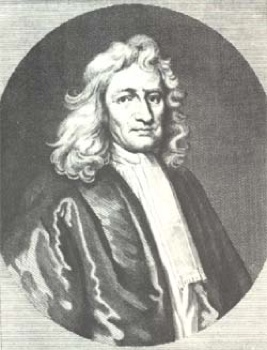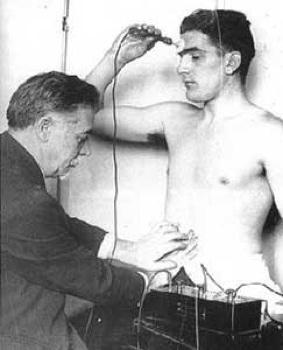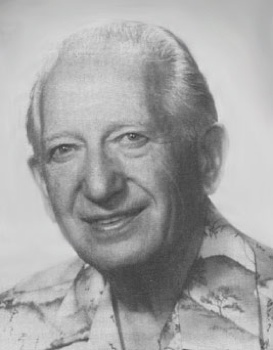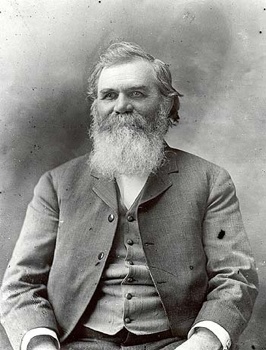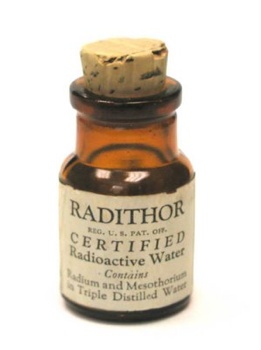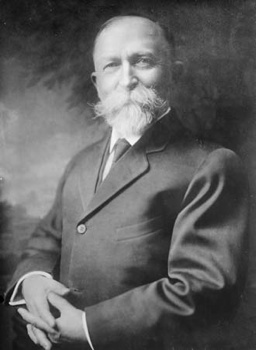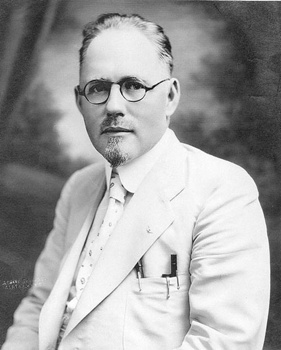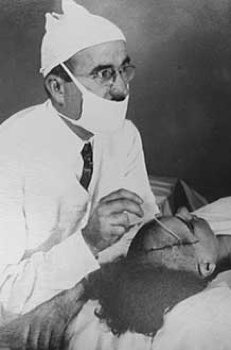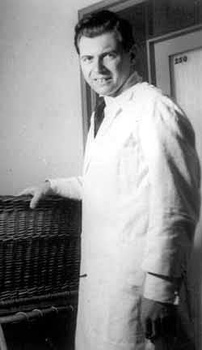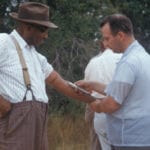The purported inventor of the “Anodyne Necklace”, Chamberlen claimed that the necklace would help “children’s teethe as well as woman’s labour”. It is no shock that children during the eighteenth century often died as infants, and as many times during infancy the baby is teething, it may have seemed natural that the teething itself was the source of illness and death. The Anodyne Necklace was invented to simply place around a baby’s neck to prevent infant death during teething. Chamberlen deserves the last place on this list for preying and capitalizing on the grief and terror of parents who were more often than not during this period resigned to the fact that their children would be more likely to die in infancy than to make it to adulthood. Unbelievably, such necklaces are still being sold today, despite an utter lack of evidence of their efficacy. See for yourself.
Invented the Dynamizer, which he claimed could diagnose any ailment simply by feeding into it a slip of paper upon which had been blotted a drop of the patient’s blood. If a drop of blood was unavailable or the patient didn’t want to give it, a handwriting sample would suffice! One made the Dynamizer work by connecting it with an electrode to the forehead of an assistant, who was stripped bare to the waist. Then the assistant was turned to face West under dim light and his abdomen struck repeatedly with a mallet. The vibrations coming off the assistant’s abdomen would indicate to the doctor the nature of the disease. The medical community, ever the distrustful skeptics, sent an Abrams practitioner a drop of rooster blood to be analyzed with the Dynamizer. The “patient” was diagnosed with malaria, syphilis, diabetes, and cancer.
Famous American chiropractor and iridologist who asserts that all of the body’s underlying dysfunctions and toxins can be identified through the iris (colored part) of the eye, despite the fact that the iris does not undergo major changes during a person’s life. Nevertheless, Jensen insisted that darker areas of the iris, or areas that changed from lighter to darker, would be read as indications that there were problems or diseases in the corresponding part of the body. Different areas of the iris would represent different limbs and organs, and the left and right eye would be read differently. For instance, if the bottom of your right eye’s iris had a dark fleck, your right kidney would be in grave danger. You can view one of Jensen’s iridology charts here.
Invented the Spectro-Chrome, which he claimed could cure ailments by changing the color of the light to which the patient was exposed. His theory was that different colors corresponded to different elements (blue = oxygen, red = hydrogen, etc.), and the lack of those elements in the body was what caused disease. Hence, if the body was exposed to that color for a prolonged period, the deficiency would be remedied, and the disease cured. Any disease except broken bones could be cured in this manner; furthermore, the patient did not necessarily have to be exposed directly to the colored lights: he or she could also drink liquids out of an appropriately colored bottle in order to achieve the same effects.
Father of modern chiropractic, Palmer’s scientific method, leading to his theory that misalignment of the spine is the most common cause of all illness in the human body, boiled down to two incidents: 1) he whacked a deaf janitor with a book during some witty banter, and a few days later the man claimed he could hear better, and 2) he manipulated an undisclosed patient’s spine and “cured” her vague “heart trouble”. On these two incidents alone, Palmer postulated that there was a fluid called “Innate Intelligence” flowing through the body that could heal any ailment and that could be made to flow more easily by unblocking pathways through the manipulation of the spine. As chiropractic is a very common practice today, this will most likely be the most controversial of the entries on this list.
President of “Radium Company” of New York and a self-proclaimed doctor who never received his medical degree, he prescribed to his patients “Radithor”, essentially a solution of radium in regular water, which he asserted would help invigorate tired patients. His most notable patient was Eben Byers, a wealthy industrialist, who drank 1400 bottles of Radithor before having his jaw fall off and subsequently dying from radiation poisoning. Upon Byers’ death, it was discovered that the radium had eaten massive holes in his brain and skull. Bailey also marketed a radioactive belt-clip (for portable “energy”) and a radioactive paperweight (presumably to perk up lethargic businessmen).
Immortalized in T. Coraghessan Boyle’s book “The Road to Wellville”, which was later made into a move starring Anthony Hopkins as Kellogg, and the brother of cereal magnate Will Kellogg, J.H. Kellogg, one of the few licensed medical doctors on this list, is well-known as an eccentric and monomaniacal leader of the “health movement”. His sanitarium in Battle Creek drew large numbers of “patients” who apparently volunteered for such masochistic treatments as: complete abstinence from any sexual activity, since it was the source of most illness; yogurt enemas to cleanse the body; marching while eating meals to help digestion; carbolic acid applications to the clitoris to prevent female masturbation; and immersion in freezing water laced with radium. Apparently, he, not Will, was the original Frosted Flake.
The “goat gland” doctor, Brinkley performed hundreds of surgeries on men who feared that their most virile days were behind them by opening up their scrotal sacs and nestling goat’s testicles alongside the men’s. There was no arterial conjoining, no grafting, no fusion – the goat gland and human testicle merely occupied the same sac, but Brinkley claimed that the extra flow of testosterone would revitalize a male patient’s sex life. Legend has it that his hypothesis turned into implementation while working for a meatpacking company, Brinkley was astounded by the sexual voracity of the goats, thus prompting him to half-jokingly suggest to his undersexed patient that he should try goat glands; to this suggestion his desperate patient responded, “So doc, put ‘em in. Transplant ‘em!” Brinkley went on to perform over 16,000 goat gland transplants. He also arguably established the first radio advice talk show in order to advertise himself and his services to as many potential patients as possible. The book “Charlatan: America’s Most Dangerous Huckster”, by Pope Brock, is an excellent starting point to learn more about this irrepressible lunatic.
A prominent neurologist and psychiatrist, he popularized the lobotomy by making it easy and convenient: “perfecting” the transorbital lobotomy, where a sharp implement (the first was an icepick from his own kitchen) was inserted through the inside corner of the eye, tapped with a small hammer until it broke through the skull bone and entered the frontal lobe of the patient’s brain, then wiggled around like a stir-stick to cut neural connections. These “surgeries” were performed outside of the operating room, without anesthetic, and after the patient was incapacitated by electroshock therapy. Freeman eventually developed his own instrument for performing the lobotomies called the “leucotome”. He decided to refine his instrument further when one broke off inside a patient’s orbital socket. Even after his medical license was revoked for killing a patient with his technique, he would travel the country in his “Lobotomobile” to service the needy and the isolated. He performed 3,439 lobotomies during his career, though the psychological and physical damage caused by his practice of psychiatry is unquantifiable. For an amazing and heartbreaking first-person account of an 11-year-old victim’s lobotomy by Freeman, “My Lobotomy” by Howard Dully is a must-read.
No list about quacks would be complete without mentioning this undisputed king of cruel and inhuman “research experiments”. The “Angel of Death” at Auschwitz, Mengele’s crimes against humanity during World War II at the concentration camp are well-documented and well-known. Some of the more notable and horrendous “experiments” he carried out were: injecting dyes into children’s eyes to see if eye color could be changed; attempting to measure how much force would be needed to break a human being’s skull (while living, of course); putting Jewish prisoners in a gigantic oven and testing how long it would take for human flesh to sustain first-, second-, and third-degree burns; sewing twins together to see if he could create conjoined twins; and rubbed ground glass into injuries to see what the effect would be. The damage Mengele did to an entire race of people, to the human spirit, and to our perception of the depravity the human mind can invent is still unsurpassed.
